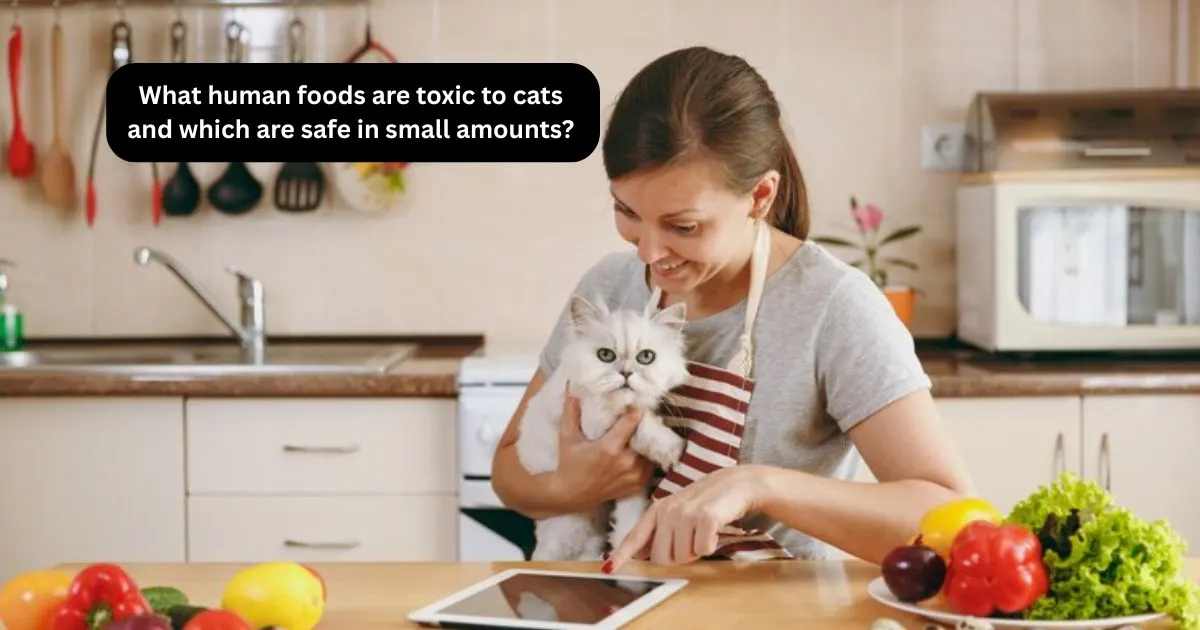Cats are delightful companions known for their independence, playful antics, and quirky habits. However, their curious nature can sometimes land them in trouble, especially when it comes to food.
While sharing snacks with your feline friend might seem tempting, many human foods can be dangerous for cats. Understanding which foods are toxic and which can be safe in moderation is essential for their health and safety.
This article provides a detailed overview of the subject, including answers to frequently asked questions and a comprehensive table for easy reference.
Human Foods That Are Toxic to Cats
Many human foods contain substances that cats cannot metabolize effectively. Eating these foods can lead to severe health problems, ranging from digestive issues to organ failure. Here’s a breakdown of common toxic foods:
- Chocolate: Chocolate contains theobromine, a compound that cats cannot process. Even a small amount can cause vomiting, diarrhea, rapid breathing, and seizures. Dark chocolate is particularly dangerous due to its higher theobromine content.
- Onions and Garlic: These contain thiosulphate, which damages red blood cells in cats, leading to anemia. Whether raw, cooked, or powdered, they should never be fed to cats.
- Grapes and Raisins: Although the exact toxin remains unknown, these fruits can cause kidney failure in cats. Symptoms include lethargy, vomiting, and increased thirst.
- Xylitol: Found in sugar-free products like gum and candies, xylitol triggers a rapid release of insulin in cats, leading to hypoglycemia (low blood sugar). It can result in tremors, seizures, and liver failure.
- Avocado: Contains persin, a substance toxic to cats. Eating avocado can lead to vomiting, diarrhea, and difficulty breathing.
- Alcohol: Even a small amount can impair liver and brain function, causing disorientation, vomiting, and severe respiratory issues.
Human Foods That Are Safe for Cats in Small Amounts
While many human foods are unsafe, a few can be offered occasionally as treats. These foods should be plain, unseasoned, and given in small quantities to avoid digestive upset.
- Cooked Chicken: A lean protein source, cooked chicken (without spices or sauces) can be a healthy snack for cats.
- Cooked Fish: Boneless, plain fish such as salmon or tuna is rich in omega-3 fatty acids, which support coat and skin health.
- Scrambled Eggs: Eggs provide high-quality protein and can be given plain and fully cooked.
- Fresh Pumpkin: A teaspoon of cooked, pureed pumpkin aids digestion and can help with constipation or diarrhea.
- Plain Rice: Small amounts of well-cooked rice can be gentle on your cat’s stomach.
- Apples (without seeds): A slice of peeled apple offers fiber and vitamins. Ensure the seeds are removed, as they contain cyanogenic glycosides, which are toxic.
Comprehensive Table: Human Foods and Their Effects on Cats
|
Food |
Safe or Toxic? |
Effect on Cats |
| Chocolate | Toxic | Vomiting, diarrhea, seizures |
| Onions and Garlic | Toxic | Anemia, weakness |
| Grapes and Raisins | Toxic | Kidney failure |
| Xylitol | Toxic | Hypoglycemia, liver damage |
| Avocado | Toxic | Vomiting, diarrhea |
| Alcohol | Toxic | Respiratory distress |
| Cooked Chicken | Safe (small amounts) | Lean protein supports muscle health |
| Cooked Fish | Safe (small amounts) | Omega-3 fatty acids promote healthy skin and coat |
| Scrambled Eggs | Safe (small amounts) | High-quality protein |
| Fresh Pumpkin | Safe (small amounts) | Aids digestion |
| Plain Rice | Safe (small amounts) | Gentle on the stomach |
| Apples (without seeds) | Safe (small amounts) | Provides fiber and vitamins |
FAQs: Human Foods and Cats
Q1. Can cats drink milk? While many cats enjoy milk, most are lactose intolerant, and consuming dairy can lead to diarrhea and an upset stomach. Lactose-free milk is a safer alternative.
Q2. Are bread and bakery items safe for cats? Plain bread in small quantities is generally safe. However, baked goods containing raisins, chocolate, or artificial sweeteners like xylitol are harmful.
Q3. Can I give my cat peanut butter? Peanut butter is not toxic to cats, but it’s high in fat and sugar, which can lead to obesity if given frequently. Always check for xylitol before offering it to your cat.
Q4. Why are grapes and raisins harmful to cats? Even a small amount can cause acute kidney failure. The exact toxin is unknown, but it poses a significant risk.
Q5. What should I do if my cat eats something toxic? Contact your veterinarian immediately. Provide details about what your cat ate, the quantity, and any symptoms observed.
Tips for Safely Feeding Cats Human Foods
- Stick to Cat Food: Commercially prepared cat food is nutritionally balanced and designed to meet their dietary needs.
- Avoid Seasonings: If you want to share human food, make sure it’s plain and free from spices, salt, and sugar.
- Moderation is Key: Even safe foods should be given sparingly to avoid health issues.
- Be Informed: Research before offering any human food to your cat, and consult your veterinarian when in doubt.
Final Thoughts
While sharing human food with your cat might be tempting, their unique dietary needs and sensitivities require caution. Many foods we enjoy can be dangerous to cats, and even small amounts can lead to severe health problems. By knowing which foods are toxic and which are safe in moderation, you can ensure your cat remains happy and healthy. If you’re ever uncertain, consult your veterinarian for expert advice tailored to your feline friend’s needs.
Remember, prevention is better than cure. Keep toxic foods out of reach, offer safe options occasionally, and prioritize a diet designed for cats.
